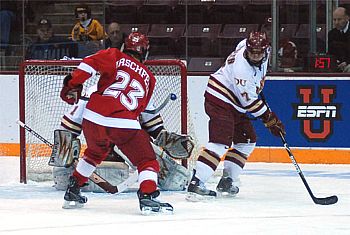When Miami’s representatives arrived for their news conference with the media on the day before the NCAA tournament, they had to talk to themselves because no one showed up to listen.
People are listening now.
An enthusiastic start, a solid defense and an unusual bounce Friday made the RedHawks the second No. 4 seed to oust a No. 1 seed in the 2009 NCAA tournament in as many tries.
Andy Miele’s late-second-period goal served as the backbreaker in Miami’s 4-2 victory over Denver in the West Regional semifinals.
Quite a change from two weeks ago, when Northern Michigan ousted the RedHawks from the CCHA tournament in the quarterfinals, leaving Miami to wait and see if it qualified for the field of 16 as an at-large team.

“Everyone in that locker room, our coaching staff, it was a second opportunity for us to get into the tournament,” RedHawks senior winger Justin Mercier said. “We had to play our best. We took advantage of the situation and we didn’t take it for granted.”
They didn’t wait for an opportunity to present itself on Friday; they took care of things themselves.
Near the end of the second period, that’s how a game that may have been teetering toward the Pioneers went back in the RedHawks’ favor.
Miele may have been the only player on the ice who knew where the puck was after his shot from close range missed the net high. That’s because, instead of glancing off the glass and sliding into the corner, it hit the divider between the glass and the Zamboni door and came right back in front.
Alone in front again, he got Pioneers goaltender Marc Cheverie to commit to the ice and flipped the puck past him with 32.7 seconds on the clock, a game-changing goal for a team that may not have needed it with the way it protected its zone.
“Everyone on the bench was screaming their heads off,” Mercier said. “We were just hoping that one of our guys found it before they did.”
A 4-1 lead at the second intermission was a big change from a 3-1 lead. Joe Colborne brought the Pioneers within two goals with 2:31 left on a power-play redirection, but that momentum quickly left Denver.
“Just when we’re thinking, hey, we still have time here, they get that three-goal differential back,” Denver coach George Gwozdecky said. “I think it had a big psychological effect, not only for us but for our opposition.”
There was also the psychological effect of the RedHawks’ defensive zone coverage, and how it limited the Pioneers to only a few good scoring chances.
Goaltender Cody Reichard saw only 10 shots in the first two periods and eight in the third as Miami lived up to its reputation as a shot-limiting force.
The RedHawks’ puck-possession game helped provide a 29-18 advantage in shots on goal.
“We thought going into the game one of the things we could do is possess the puck because of the extra ice that’s out there” on Mariucci’s Olympic-sized rink, Miami coach Enrico Blasi said.
But Miami also proved itself a balanced offensive team, getting goals from all four lines.
The RedHawks pounced on a lackluster start by Denver. Their lead stretched to 2-0 by the end of the first period and 3-0 just over five minutes into the second.
Mercier snapped off a shot past Cheverie to start the run, and Miami doubled its advantage behind winger Alden Hirschfeld’s fourth goal of the season late in the period.
Miami (21-12-5) put itself fully in control when Bill Loupee scored just his second goal of the season, on a rebound 5:36 into the second.
“This time of the year, there’s matching lines going on and you don’t know what’s going to happen each shift,” said Miami winger Tommy Wingels, who, with two assists, was the only RedHawks player with more than one point. “Different guys are going to step up each game, each shift.”
Colborne’s goal gave Denver (23-12-5) just its ninth shot on goal in 37:29 of playing time, and it broke a Pioneers scoreless streak of 111:28.
But it didn’t break Denver’s funk.
“They were just winning the battles early on and beating us to loose pucks,” said Pioneers center Tyler Bozak, who scored a power-play goal in the third to cut the lead to 4-2.
Miami earned its third straight trip to the regional finals, and this time, it doesn’t have to try to get past Boston College.
The Eagles ended the RedHawks’ season in 2006, 2007 and 2008. The last two came in the regional final, and last season’s was especially painful in that Miami had a two-goal lead in a game that eventually went to overtime.
BC isn’t around to stand in Miami’s way this time, but the leftover feeling is one of the things guiding the RedHawks this year.
“Last year, you almost could taste it out there,” Mercier said. “So we kind of feed off that.”
